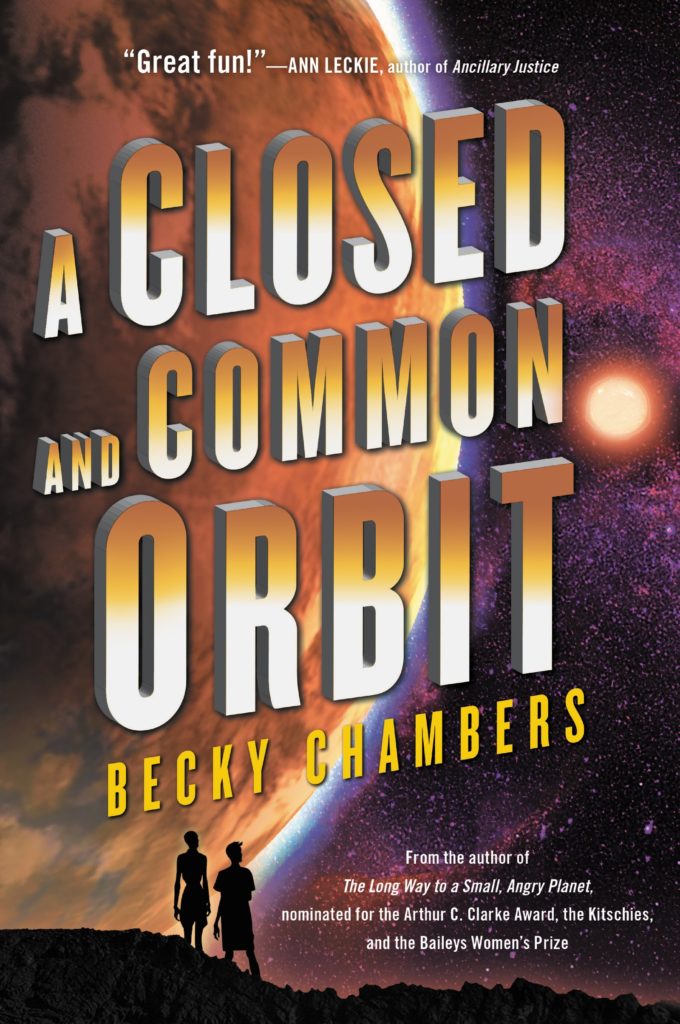 A Closed & Common Orbit (2016)
A Closed & Common Orbit (2016)
Written by: Becky Chambers
Pages: 342 (Trade Paperback)
Series: Wayfarers (Book 2)
Published by: Harper Voyager
Why I Chose It: As part of this year’s Hugo read, and because I had heard a lot about this series, generally all positive, and wanted to read it.
Spoilers for both A Long Way to a Small, Angry Planet (significant ones!) and for A Closed and Common Orbit (smaller spoilers.)
Discussion: There are going to be three parts to this discussion. First, a look at A Long Way to a Small Angry Planet because these books are not really standalone. The second part will be the discussion of A Closed and Common Orbit, and the third will be how I feel about this book’s chances of winning the Hugo.
I begin with a confession. I am always bemoaning there isn’t enough entertainment media based around people behaving with kindness, compassion, and intelligence. Stories where big problems are solved with common sense and determination. Becky Chambers’ Wayfarer series is exactly that sort of story: people who try to solve their problems rationally and with the help of supportive friends. As with most wishes come true, turns out I didn’t want that as much as I thought I did. I craved more vivid conflict, more external conflicts. A clear bad guy to defeat.
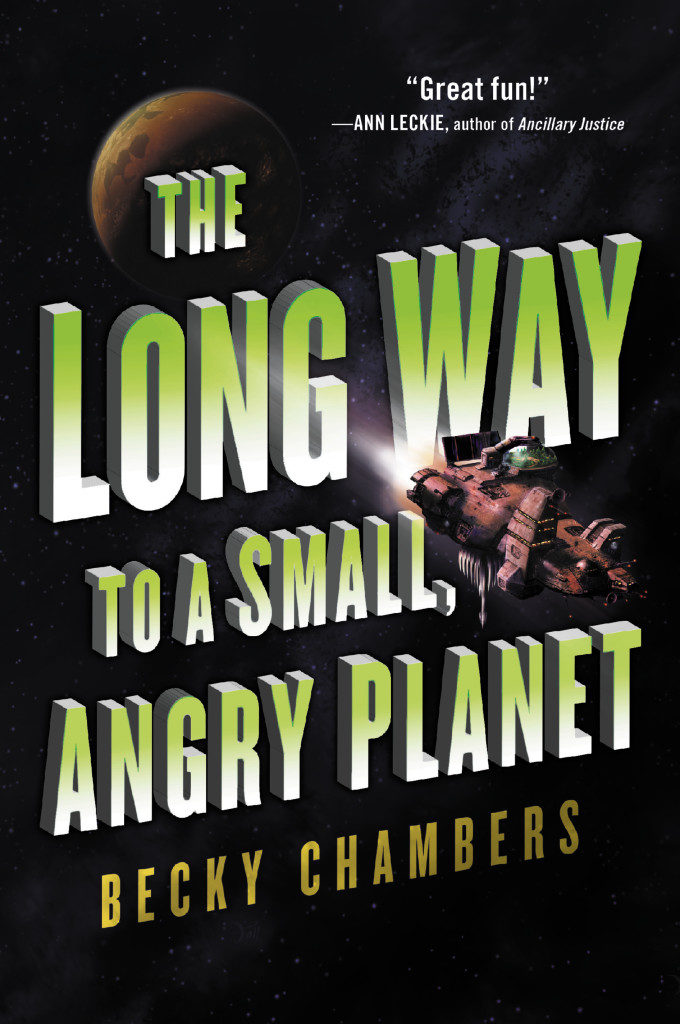 On top of that, Chambers really doesn’t dwell on the conflicts. They’re discovered, and there’s not a lot of wallowing or struggle with them, because these characters are sensible and they have support. When a problem appears, and it’s too big for them to solve themselves, they turn to each other. And that has the strange sense of making the conflicts less important than the methods used to deal with them. These characters talk their way out of problems — not one-liner style — just slow, careful communication. In A Long Way to a Small Angry Planet, there is one instance where talking cannot solve the problem so the characters flee for their lives (sensible!), but since this is the only instance of a problem not being resolved, it had a strange effect on me. I kind of pictured the characters reaching out to the Toremi (the people of the angry planet in the title), then recoiling at their irrationality and running away like a herd of startled antelope — flee for your lives, people we can’t reason with… aaaah!
On top of that, Chambers really doesn’t dwell on the conflicts. They’re discovered, and there’s not a lot of wallowing or struggle with them, because these characters are sensible and they have support. When a problem appears, and it’s too big for them to solve themselves, they turn to each other. And that has the strange sense of making the conflicts less important than the methods used to deal with them. These characters talk their way out of problems — not one-liner style — just slow, careful communication. In A Long Way to a Small Angry Planet, there is one instance where talking cannot solve the problem so the characters flee for their lives (sensible!), but since this is the only instance of a problem not being resolved, it had a strange effect on me. I kind of pictured the characters reaching out to the Toremi (the people of the angry planet in the title), then recoiling at their irrationality and running away like a herd of startled antelope — flee for your lives, people we can’t reason with… aaaah!
In Chambers’ universe, most people are good. They want to communicate. They want to get along. There are very few exceptions. I’ll come back to that.
A Long Way to a Small Angry Planet was an enjoyable read, but it confounded me in several ways.
The Premise of A Long Way to a Small Angry Planet:
Follow a motley crew on an exciting journey through space — and one adventurous young explorer who discovers the meaning of family in the far reaches of the universe — in this light-hearted debut space opera from a rising sci-fi star.
Rosemary Harper doesn’t expect much when she joins the crew of the aging Wayfarer. While the patched-up ship has seen better days, it offers her a bed, a chance to explore the far-off corners of the galaxy, and most importantly, some distance from her past. An introspective young woman who learned early to keep to herself, she’s never met anyone remotely like the ship’s diverse crew, including Sissix, the exotic reptilian pilot, chatty engineers Kizzy and Jenks who keep the ship running, and Ashby, their noble captain.
Life aboard the Wayfarer is chaotic and crazy — exactly what Rosemary wants. It’s also about to get extremely dangerous when the crew is offered the job of a lifetime. Tunneling wormholes through space to a distant planet is definitely lucrative and will keep them comfortable for years. But risking her life wasn’t part of the plan. In the far reaches of deep space, the tiny Wayfarer crew will confront a host of unexpected mishaps and thrilling adventures that force them to depend on each other. To survive, Rosemary’s got to learn how to rely on this assortment of oddballs — an experience that teaches her about love and trust, and that having a family isn’t necessarily the worst thing in the universe.
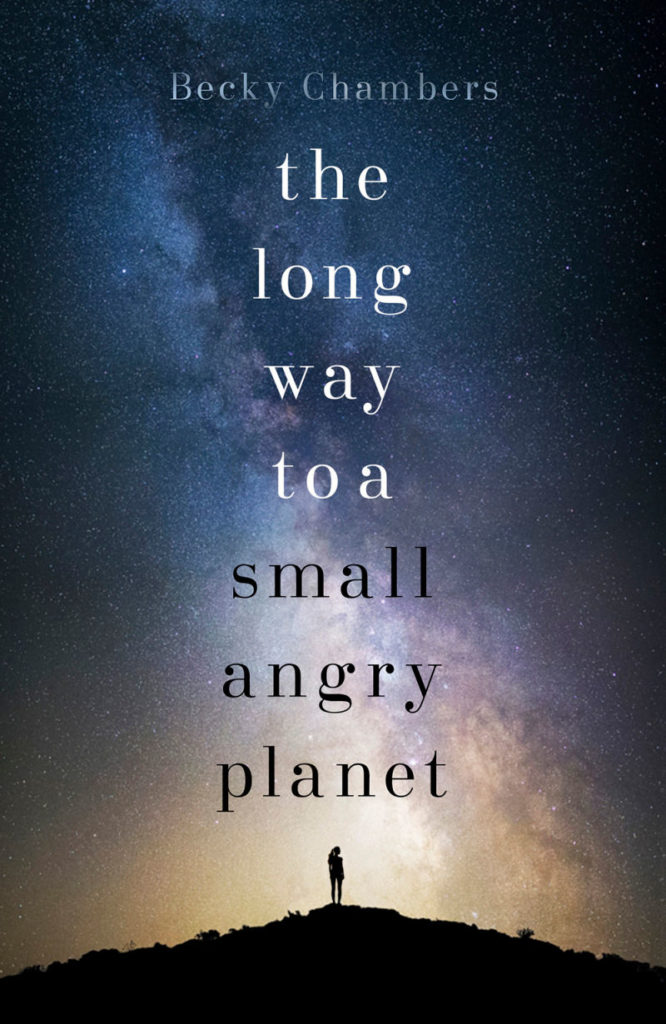 The blurb primed me to think of Rosemary as the main protagonist, and she’s really not. There are multiple POV and character arcs. Personally, I found Rosemary the least of the characters and assumed she got the lion’s share of the beginning pages as an easy way to introduce the readers to the ship’s crew and to life in space. I thought her arc fell kind of flat. She has a Big Secret, which was supposed to create conflict, and in the end, the other characters shrug and accept it, with an admonition not to lie again. See, above, most people are good.
The blurb primed me to think of Rosemary as the main protagonist, and she’s really not. There are multiple POV and character arcs. Personally, I found Rosemary the least of the characters and assumed she got the lion’s share of the beginning pages as an easy way to introduce the readers to the ship’s crew and to life in space. I thought her arc fell kind of flat. She has a Big Secret, which was supposed to create conflict, and in the end, the other characters shrug and accept it, with an admonition not to lie again. See, above, most people are good.
I liked these characters and the problems they faced, but the pacing was slow and staccato. A collection of entertaining scenes more than a driving plot. It was easy to put the book down and wander off.
There was one scene that really didn’t work for me.
Jenks, an engineer aboard the Wayfarer, is head over heels in love with the AI, Lovelace who reciprocates his affection. They’ve gotten hold of a “kit,” i.e., a manufactured human body that she could live in. (Since it’s a female kit, I’m calling Lovelace a “she,” but technically she’s ungendered.) This kit is very illegal. Just owning it will get you in trouble. But Jenks has gone through the trouble of sourcing it, buying it, transporting it aboard. Then he gets cold feet — ostensibly due to another crew member’s brush with the law — and makes the unilateral decision not to go through with this. That felt weird to me, since these characters are all so much about not denying each other agency. But Jenks says flatly, it’s too dangerous, and Lovelace sort of accepts it, since she can be with him on the ship. It really stuck out to me, and I ended up feeling like Jenks preferred the idea of Lovelace to the reality of her being independent of him and the ship, and that made me like him less. I also felt certain this was not Chambers’ intention at all. The point being, this decision stuck out and not in a good way.
My discomfort was compounded, because in the end, Jenks’ decision not to risk transferring Lovelace became irrelevant. Since the Wayfarer and its crew are in the middle of a yearlong journey to create a wormhole tunnel in a dangerous section of space, Jenks would have had to wait to transfer her until the job was done — or risk tinkering with the AI that keeps them all alive and flying in the middle of space.
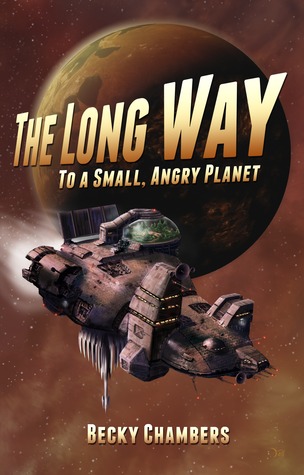 During the Toremi attack, Lovelace has her circuits fried. To repair Lovelace requires a reboot which destroys her personality. Jenks is inconsolable. Me, I felt stuck in the awkward spot of being irritable about Jenks’ grief because I’d already decided he didn’t care all that much for her.
During the Toremi attack, Lovelace has her circuits fried. To repair Lovelace requires a reboot which destroys her personality. Jenks is inconsolable. Me, I felt stuck in the awkward spot of being irritable about Jenks’ grief because I’d already decided he didn’t care all that much for her.
It’s a writer thing. The characters’ choices should change outcomes but Jenks’ unilateral decision to not transfer Lovelace to the kit made no difference to the outcome, except to make his grief feel a little hypocritical.
In the end, Lovelace’s new personality is offloaded into the kit and taken away by a friend because Jenks can’t bear to be around her. The Wayfarer gets a new AI.
The reason I harp on all of this so much is because A Closed and Common Orbit is centered on AI rights — or lack thereof. The instigating plot thread is the fallout from Lovelace being “reborn,” told she’s unwelcome, getting shoved into an illegal kit, and carted off to live a human life on a planet. I ended up feeling that A Long Way to a Small, Angry Planet was primarily to set up the second book, which also made me feel like A Closed and Common Orbit was the book Chambers really wanted to write. And in a lot of ways, I feel like this might be true. She’s definitely more sure-handed with the second one.
So let’s talk about A Closed and Common Orbit.
The Premise:
Embark on an exciting, adventurous, and dangerous journey through the galaxy with the motley crew of the spaceship Wayfarer in this fun and heart-warming space opera — the sequel to the acclaimed The Long Way to a Small, Angry Planet.
Lovelace was once merely a ship’s artificial intelligence. When she wakes up in a new body, following a total system shut-down and reboot, she has no memory of what came before. As Lovelace learns to negotiate the universe and discover who she is, she makes friends with Pepper, an excitable engineer, who’s determined to help her learn and grow.
Together, Pepper and Lovey will discover that no matter how vast space is, two people can fill it together.
The Long Way to a Small, Angry Planet introduced readers to the incredible world of Rosemary Harper, a young woman with a restless soul and secrets to keep. When she joined the crew of the Wayfarer, an intergalactic ship, she got more than she bargained for—and learned to live with, and love, her rag-tag collection of crewmates.
A Closed and Common Orbit is the stand-alone sequel to that beloved debut novel, and is perfect for fans of Firefly, Joss Whedon, Mass Effect, and Star Wars.
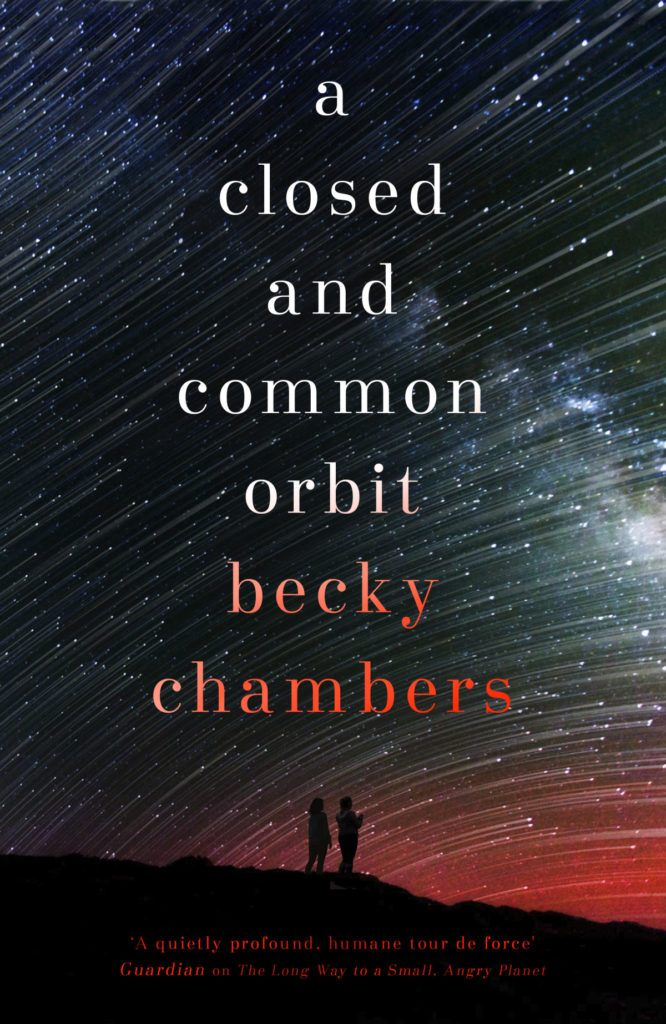 Discussion: Okay, first off, I don’t like whoever’s doing the blurbs for these books. They’re just good at being vaguely accurate yet, somehow really wrong. Not to mention out of five paragraphs up there, only two are actually about the current book. If you want to know what A Closed and Common Orbit is about, read the second paragraph and that’s half of what the book is.
Discussion: Okay, first off, I don’t like whoever’s doing the blurbs for these books. They’re just good at being vaguely accurate yet, somehow really wrong. Not to mention out of five paragraphs up there, only two are actually about the current book. If you want to know what A Closed and Common Orbit is about, read the second paragraph and that’s half of what the book is.
Lovelace learns to cope with a body and creates a life for herself. Pepper, the excitable engineer, has a whole separate plot arc from Lovelace’s story, and in the end, it’s her story that drives the plot for both Sidra and herself.
I have another confession. I’m not a big fan of AI/humanity stories. Too tilted toward philosophy. That said, Chambers avoids the “what is life, anyway?” clichés and just gets down to the meat of the story. She’s more interested in what makes a good and satisfying life than in the nitty-gritty of determining what’s alive. That made me a fan.
A Closed and Common Orbit subtracted characters by the handful from the previously large cast. There’s no ship’s crew here. I think that was a good choice. While the Wayfarer’s crew were all interesting and likable, there were a whole lot of voices in a small space, all telling their stories and as a result, the book felt choppy. A Closed and Common Orbit didn’t have that problem. Here the focus is primarily split between Sidra (Lovelace, renamed) and her friend/caretaker, Pepper. Because of this, there’s more time to spend with each character, and their arcs were the stronger for it.
It’s a doubled fish-out-of-water story, a doubled coming-of-age. Pepper’s story arc is her past life, her origin story, how she became Pepper, the excitable engineer, living in the Market. We learn how as a child she fled a place where she understood all the rules and found a life that was strange, difficult, and… better. Sidra has a similar arc. She’s coming from being a shipboard computer where she knew her purpose and her environment (the vast openness of space) to existing in a small, easily overwhelmed computer brain on the ground with no purpose other than to make a life for herself. Though unlike Pepper, I’d argue that Sidra’s life in the end isn’t better, just different.
As in Small Angry Planet, the conflicts are quiet, resolved through talking and patience and compassion. And again, while I liked the characters, I wasn’t drawn strongly into their troubles, because I knew they’d work it out.
Because most people in Chambers’ world are good.
Sidra has a life-threatening secret. AIs are not allowed to be in kits, not allowed to be roaming free. But when her new friend, Tak, finds out what she is… there’s no real conflict. Partly, this is due to Chambers’ good people syndrome. Tak is shocked, but sensible. Tak asks questions until she understands, then they go on with their friendship. (Sidra’s friend is an alien Aeluon who flips gender midway through their friendship, so like Sidra’s kit, I’m using she because that’s the gender Tak was when Sidra’s secret was revealed.)
Partly, the lack of conflict is due to the nature of AI. Sidra doesn’t fear being shut down (killed), so it’s hard for the reader to fear. She’s not even sure she wants this life as an AI in a kit, so why worry so much about losing it?
Pepper’s arc is chock full of conflict — girl against the machine, girl against nature — but even then, the reader knows she survives all of this, because here she is, helping Sidra.
None of this is a bad thing. But, like A Small Angry Planet, this lack of driving conflict did make the book hard to keep the reading urgency going. I put the book down a whole lot of times and picked it up again, and the hiatus didn’t really interfere with the reading process.
Even then, though, I thought there was a segment of time that dragged. Pepper’s past story-line starts montaging through the years, taking her from a child to a young adult, so it’s more disconnected than usual. This happens at the same time Sidra’s stuck in a melancholic rut, trying to figure out a way to come to terms with her new limitations.
But after that moment, things ramp up. Pepper has a driving goal throughout this book — to be reunited with the AI, Owl, who saved her life, raised her, and helped her escape her original planet. Pepper escaped, but her ship and Owl were lost to her. Now Sidra is going to get Owl back for her.
The ending is very satisfying and more than makes up for the slow segment.
There was a small thing I didn’t like based on my working theory of “most people in this world are good.” That’s apparently true of individuals. Not of corporations. Pepper’s early life is a slave life, denied freedom, denied even knowing freedom exists, or that there’s literally an outside of the warehouse she works in. But given that every character we meet is laid back, compassionate, willing to listen, etc., I find it hard to believe that this slave-girl business is even tolerated.
I would have liked to see more of the wider world, but that’s not the type of story Chambers is telling. Her focus is tight and personal, so my questions about how this could happen, to what purpose are they toiling anyway, why are their “Mother AIs” allowed kits, but others aren’t…. On the one hand, it’s frustrating. On the other hand, it points out that Chambers built a bigger world than the story at hand, and that’s something I generally like. It makes me feel like so much is going on just around the corner and helps the world-building feel real.
The Hugo Nomination: If you’d asked me midway through this book what I thought about its chances of winning, I would have had to say I wasn’t sure why it was nominated at all. Sure, Chambers does a lot of interesting things with society and gender and alien cultures and exploring technological implications… and then I realized oh yeah, that’s why. The storyline is just so gentle and hopeful that it’s easy to overlook all the big idea stuff that she’s putting on the page. Somehow, we’ve been conditioned to believe that award-winning often equals grim.
In the end, I felt like Chambers had something genuinely powerful to say about the nature of humanity and purpose and what makes a satisfying life and what doesn’t. I still don’t know if this book will win. I haven’t read most of the books in this nominated field, except N.K. Jemisin’s The Obelisk Gate, which is a very different sort of book. I know it’s up against All The Birds in the Sky, which already won the Nebula, and the Hugo and Nebula sometimes go in sync. I don’t think it really has a chance against the splashy powerhouses here, but A Closed and Common Orbit might pull it off anyway.

You know, I’m still really intrigued by this. I’m wondering now if I’ll have the same reaction to you: I say this is what I want, but will I still want it when I read it? I’ve got the first book on my Kindle, so there’s one way to find out….